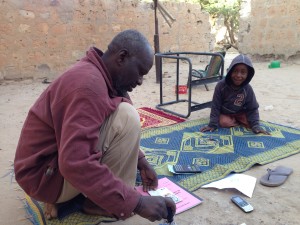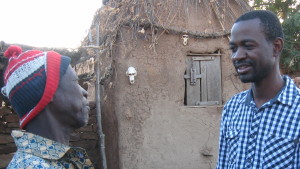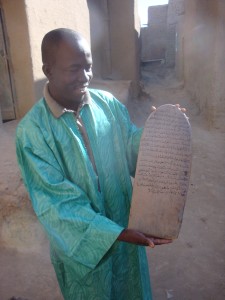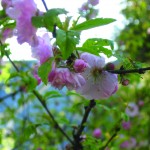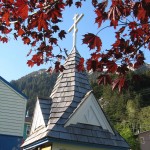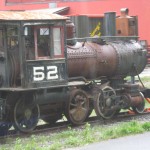
I was making a face for the camera at the time, but at the moment it is more like how I feel about this trip!
So today I found a foreign language collection of tapes for the widespread Maliian language Bambara. (Maybe I can leave the French to Kathie?) And I’ve survived the yellow fever vaccination reaction, and my passport has the Mali Visa ready to go. More and more it feels like a real trip. When I visit with people who have travelled to Africa, they are glad for us going to Brussels for a few days first. That means we’ll have a chance to adjust to the time zone change before we land in the capitol city Bamako for the 16-day tour.
Brussels at Christmas should be a destination all by itself though. Chocolate and lace, beer and old Europe, altogether a great start. I found an apartment very close to the Grand Place and with a kitchen we don’t have to eat out all the time. Might have a side trip to Bruges or anywhere else, and we have to make our way to Charles de Gaulle airport to fly to Africa.
Here’s the tour itinerary:
Mali Mystere 16-day tour : From the River to the Desert
Bamako, Djenné, Dogon country, Mopti, Niger River, Tombouctou and the desert, Ségou, Bamako.
Day 1: Saturday – Bamako
Upon arrival at the airport in Bamako , your guide is there to welcome you and accompany you to dinner. Overnight at the hotel Tamana.**
Day 2: Sunday – Bamako to Djenné
Morning departure from Bamako to Djenné via an air-conditioned 4×4. We will pass beautiful mud villages and meet with villagers who will explain the tradition of millet and the traditional costumes made from bazin. Lunch en route. Dinner and overnight at an encampment/hotel.** You will enjoy breakfast in the lovely shaded terraces.
Day 3: Monday – Djenné
Morning tour of the city and its rich history, with the largest and most beautiful mud mosque in Africa and the world. Monday is the day of the colorful weekly market, where you can find lovely traditional fabrics. You will walk through the narrow alleys to explore the majestic Sudanese-style mud buildings. Behind each door a warm welcome awaits you. Djenné is the ideal setting to enjoy the great variety of ethnic groups that inhabit the Niger River Valley and the inland delta. Lunch in a local restaurant; the afternoon is free to enjoy the market; dinner and overnight at an encampment/hotel.**
Days 4 – 7: Tuesday to Friday – Dogon Country
Morning departure for Dogon country via the Bandiagara cliffs. Lunch en route. Change of scenery for 4 days, amid Dogon villages with their unique cultures and long-held traditions.
Hike along the cliffs to meet the villagers and ancient dwellings of“Tellems.”?You will discover the Dogon traditions of weaving cotton to make bogolan (mud cloth) as well as carving wooden masks and fertility statues. Each village hosts its Tougouna, a place of exchange that welcomes all village elders, called the “house of words.” Discover Dogon cliffs, plateaus and plains through trekking. Nights are spent in safe, comfortable encampments in the village.
On the seventh day, we return to the 4×4 and depart for Mopti.
Guided tour after lunch: the crossroads of trade on the Niger River. Observe dugout canoes and pinasses being built. You will be surprised by the elegance and unique colors of each pinasse; this is how the city of Mopti gained the prestigious name “the Venice of Mali.” Dinner and overnight at the hotel “Ya Pas de Problème” [the quaintly named, There is no Problem Hotel]**. Do not deprive yourself of capitaine skewers, a succulent white fish and local Mopti specialty!
Days 8: Mopti – Tombouctou by Pinasse
Morning departure via a fully equipped, motorized pinnase along the Niger River . Three days and two nights to experience the tranquility of the river:?meeting Bozo fishermen, visiting villages and witnessing the smoking of fish, roaming livestock, and petty trade; crossing Mali ’s largest lake, ” Lake Debo ” where many species of migratory birds reunite; and swimming with our friends the hippos! Every night at sunset, we reach beautiful places to camp along the riverbanks in complete safety. Somehow the river will make you work up quite an appetite for fresh-caught fish, eaten sitting around the campfire under a brilliant sky of stars.
On the tenth day, arrive in Tombouctou in the afternoon and overnight at the hotel Ya Ka Seme or Colombe **.
Day 11: Tuesday – Tombouctou
Morning tour with a historian who will unveil the rich cultures and traditions of this most famous, mysterious city. Discover its mosques, the center of 16th century manuscripts, the houses of early explorers, the museum, the traditional spice market, and witness the creation of handicrafts and silver jewelry. During lunch with a Tombouctou family, (Note: someone on trip advisor says this is our tour guide’s mother!) you will taste a local specialty with 12 spices. In the afternoon, depart for a camel ride in the desert. You can savor the beauty and total silence of the desert. Meet my friends the Tuaregs and their leader Ibrahim who will tell you the legends of the Sahara under a star-studded night sky by the fire. We will partake in traditional Tuareg meals and tea, and spend the night under the dazzling stars or in a Tuareg tent.
Day 12: Wednesday – Tombouctou
Return to Tombouctou by camel; free afternoon in the city of 333 saints.
Dinner and overnight at the hotel Ya Ka Seme or Colombe**.
Day 13: Thursday – Tombouctou to Mopti
Morning departure by air-conditioned 4×4 where you will have the pleasure to enjoy magnificent scenery.
Picnic en route. Arrive Mopti in the early afternoon. Dinner and overnight at the hotel “Ya Pas de Problème.”**
Day 14: Friday – Mopti to Ségou
Morning departure to Ségou. You will marvel at the giant, luxurious baobab trees lining the roads, as well as Bambara and Bobo villages. We will stop briefly to admire the mosque in San. Arrive Segou in the mid-afternoon; dinner and overnight at the hotel Esplanade.**
Day 15: Saturday – Ségou to Bamako
In a morning tour of Ségou, you will have the opportunity to discover the pottery made by a cooperative of women in the market, and the dye house where everyone can paint a bogolan. Lunch on the restaurant then depart for Bamako for 3h30min drive; enjoy the afternoon at leisure; dinner is at a local restaurant. Overnight at the hotel Tamana**
Day 16: Sunday – Bamako
Morning tour of the city: the home of artisans, the market with fruit and spices, the National Museum. Lunch is at a restaurant; the afternoon is at leisure; finally, transfer to the airport with the help of your guide.
(Note: somewhere else indicates the ** have a meaning about the lodgings. Mostly that a 5 star “western style” hotel is out of the question, that the best lodgings in Mali would be more rustic, or words to that effect.)
For the 16-days tour: The cost: 1940 Euros
Included:
The rental of a the car and driver throughout the stay;
The fuel,
The pinasse (boat) rental;
Overnight stays in hotels and encampments
Three complete meals per day for the entire trip;
Tourist taxes; hotel taxes; the accompanying guide
Not included:
The international flight, drinks
Responsible travel: Cultural tour of Mali
Community
We work hard to ensure positive impacts to the local communities and surroundings that we encounter, and encourage travellers to contribute items that are inexpensive and easy to pack, such as pens for schoolchildren and recycled clothing.
Our group sizes typically range from 5 to 9 people, which we believe minimizes impact to the environment and allows our travellers to gain more insight into their surroundings through more individual attention from our guides. We derive ultimate satisfaction from teaching our guests about Malian culture and keeping our traditions and heritage alive through carefully-planned, sustainable, developing tourism.
We employ 100% local guides, drivers and cooks. Guides are selected who already have special knowledge about the areas they will introduce to tourists, have numerous local contacts, and constantly seek to increase their knowledge and have a passion for teaching tourists about their environments. With visits to local fruit and spice markets, a local women’s cooperative selling pottery & eating in local restaurants, this trip helps to stimulate the local economy.
Environment
In Mali, key tourist destinations are spread far throughout the country, and we plan tours carefully so as to maximise ride sharing. We make sure to arrange transport that accommodates maximum capacity while still maintaining comfort for our guests. Mineral water is safest for tourists and we always offer empty bottles to children and adults along our journeys who will continue a long cycle of re-use for the bottles. Mali currently is working to reduce large amounts of plastic bags that are not properly disposed of throughout the land, and travellers are quickly made aware of this and encouraged to individually do their part to dispose of any waste in designated facilities.
Related Images:

